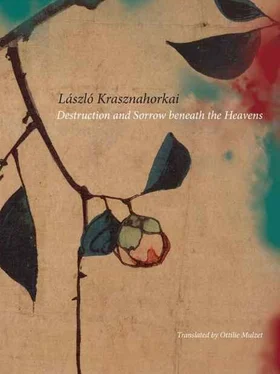Stein, with the greatest joy, says yes, the master arises from his armchair and they embrace, then they bring out a camera and as everyone poses for a picture — the interpreter in the tub in the middle, of course, and Stein and the master and the woman with the two children around him — the master of the workshop, to his very best and his only foreign friend, solemnly promises to carve for him a Guanyin of extraordinary beauty, and let there be no worry about the cost, because he will calculate the most advantageous price for him, but still, how much, Stein asks, and the master begins to laugh confusedly, like someone who is counting within, and then he asks what size the guest was thinking of, the guest shows the size, well, he reflects, still smiling confusedly, he could prepare one, but this will be the most beautiful one that he has ever, ever prepared — he raises his index finger — well, then, he could prepare one for. . 800 yuan — that’s fine, answers Stein, let the price be 800 yuan, and it will be the most beautiful Guanyin he has ever made. They take the photographs, and in high spirits they disperse, the children and the woman behind the door, and the guests slowly prepare to leave: they write their home address on a piece of paper, where, according to the prediction of the master, a Guanyin, more beautiful than any other, will certainly arrive, they pay him the 800 yuan, and they add 2 yuan for the postage, and they are leaving, but the master, clearly overcome, stands in his office, and does not want them by any means to set off: first, he suggests they have lunch together, from this point on let them be his guests for the day, then when they tell him that so little time do they have in Jiuhuashan that if they want to see anything at all before it grows dark, even with an aching heart, they must refuse his invitation, and he becomes so sad that they can hardly console him, they must drink at least one more tea, and then another and another, and then they are finally outside in the courtyard, and they are walking towards the gate, and there he stands in the doorway of his office and he waves, and he calls after them that the Guanyin will really be the most beautiful and they can see him wracking his brain to find a reason to call them back, like someone who doesn’t want them to leave, like someone who doesn’t want them to be submerged — leaving the protection that he can offer to them — yet again in the unknown fog of Jiuhuashan.
The stairs are as much of an essential element of the sacred elevations in Jiuhuashan as the monasteries; they enmesh the mountain from one end to the other, they announce the presence of the resting spots, the pavilions, the connecting paths, the detours, the paths, the magnificent lookouts as well, they indicate a kind of safe passage in this particularly untraversable, precipitous slope, a decided connection between the numerous monasteries; the system, however, is so complicated, especially to figures such as the two of them in the middle of this thick fog, that even marching along continuously for hours is not enough for them to get their bearings; indeed, as far as that goes, now that they are climbing outside in this complicated and essential stairway-network, they are forced to admit that they are no closer to having any idea as to what kind of consideration brought this system into being, who built it, the knowledge of which all the same would be indispensable to traffic on the mountain — and not only are they compelled to admit this, they admit it with the greatest bitterness, for somehow, again, the long minutes—10 minutes, 20 minutes — are passing and they are not coming across even one of the monasteries they long so much to see, they just keep going, always just hoping that in the next, but in the next, moment something will certainly leap out at them, a gate leading into the Baisui Gong[11] or the Huatian Si; but no, in the fog they find neither the Baisui Gong nor the Huatian Si while the interpreter notes with resignation that, in his opinion, it is also starting to get dark — that’s not possible, Stein protests, obviously it’s just the thick fog blocking the light, but no, the interpreter shakes his head listlessly, according to him this is not a mistaken impression — and here is the most tangible of reasons, that is to say, the watch on his wrist is now pointing to four o’clock, quite simply, evening has begun to fall.
If it is really four o’clock — they once again withdraw beneath the roof of the pavilion, away from the seemingly never-ending eaves — if it is already getting onto four, says Stein, that means then that the monasteries will be closed very shortly. And so nothing would be more sensible, says his companion, than to put off everything else till tomorrow, go home to the hotel, have a good bath and rest, well wrapped up, from this day of not-inconsiderable ordeals. He looks at Stein hopefully, and it is clear that he is prepared for the most vehement of debates, anything to convince the other to give up — well, that’s a good idea, the other bows his head, he drinks the last sip of tea from the plastic tea flagon, and they head off towards home. It’s strange, but now they suddenly find the staircase which leads downward, the one which later on does not suddenly begin heading upward again, as has happened so many times on this extraordinary day, they trudge downward, holding on to the railing, because the staircase is very slippery, when suddenly, due to the fog, once again, fairly unexpectedly, a person appears before them. Judging from his bouncy gait, it is a young man and it seems that with his rubber boots, and a plastic bag in his hand, he too is steadily heading downward, so that so far everything would be fine, it’s just how he is going down the stairs in front of them that strikes the eye immediately, that is, on the one hand, there is an uncommon resolve in his movements, on the other, however. . he is not walking like them, holding on to the railing, moving in a straight line; instead, he is waddling, as one used to call it in childhood, waddling here and there but all the while systematically descending; he goes from one side, let’s say, from the railing on the right to the railing on the left, but, in the meantime, taking three or four steps down, so that he progresses — and this is truly the correct expression — systematically, and really, like someone who still has a few kilometres in front of him so that he does all this seriously, so it isn’t possible to think that this person in front of them here — who nonetheless is certain that no one sees him — is feigning anything, no, the two visitors look at each other incredulously, he is not pretending, there is something wrong with him; moreover, when they get closer to him, and he looks back, frightened, realizing that someone is behind him, it immediately becomes obvious that he is not crazy. So what then? What is going on here? Stein looks the interpreter questioningly, but he just shakes his head and watches how, from that point on, the man in front of them does not begin to walk with a regular gait, now that he knows that they are watching him, but progresses in the same way, waddling here and there between the left and right sides of the staircase.
Stein motions to his companion to follow and, quickening his steps, catches up to the man in front of them, but since he is obliged to take up his style, he too begins to walk in the same way , zigzagging downward, from one side to the other, mimicking him as much as he can, so that he can speak to him, for he has not changed anything about his peculiar gait even though there is someone right beside him.
‘You wouldn’t happen to know where the hotel is?’
‘Are you looking for the Huacheng Si?’[12]
‘No, the monastery is probably closed already. The hotel.’
Читать дальше












